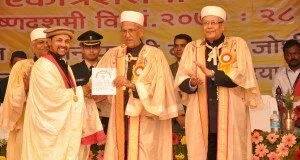There is a story about two slaves, in the Malayalam Novel ‘Govardhante Yaathrakal ’(The Journeys of Govardhanan). Although they feel happy when their master frees them, they are not able to live after that. Because, they didn’t know how to live a ‘free’ life. At the end, they return to their master and turns slaves again. In short, as they were the slaves of ‘slavery’, they were unable to escape from it.
Each of us is slave to many things- varying interests, weaknesses, intimacies and so on. To those, who have many ‘likes’ in their life, Allah reminds to like Him the most. To us, who keep intimacy with various people and things, Allah commands to keep the greatest closeness to Him. To those, who become slaves to many things, Allah repeatedly reminds to become the slave of the real Master.
People become slaves of wealth, fame, luxury, intoxication or amusement. For a few, physical urges are the greatest weakness. Some are slaves of Clerics, leaders and their own friends. It is to such people, who part all the love in their hearts to many, Allah orders that the greatest love and friendship should be towards Him. It is to remind ourselves the same thing, each of us are asked to pledge “my supplications, worship life and death are for the Lord of the worlds“, during five times prayer and by placing our hands over our heart. It is with the same intention He orders us to proclaim ‘Allah is the Greatest’ when we throw stones in ‘Jamrah’ during Hajj. Many things were of priorities in our lives, till that day – our family, children, wealth, fame and and so on. But by throwing all those priorities towards ‘Jamrah’ during Hajj, we declare that Allah is the greatest.
Hajj trains us to dedicate ourselves completely to the Lord. At times, (as a part of Hajj rituals) Allah orders the ‘Haji’(One who performs Haj) to walk, run, throw, circulate, stay overnight, perform compulsory prayers combined and are obeyed without any doubt or question. Allah orders us to keep this obedience throughout our life. This aspect is included in every act of worship in Islam.
This is an era where the greed for money is at its peak. Even believers get tempted to earn money in whichever way they can. Number of people who ensure that their income is ‘halal’ (permitted by God) has declined. We tend to borrow in excess even if the need is not immediate. We hear many stories of people who ruin their life immersed in Bank Loans.
A Muslim should not have any relation with interest, in his/her life. It is a hateful sin, cursed using extreme words in Islam. Prophet (SA) warned us that earning even a penny (one Dhirham in Hadhees) through interest is greater sin than committing adultery 36 times. Still, do we take this matter very seriously in our lives?
When amenities increase, closeness to Allah tends to decrease. Still, we wish to get the amenities multiplied. Kabbab (RA) was crying like this during last minutes of his life, ‘My companions passed away without taking any worldly rewards, but Kabbab is going to die after enjoying abundant amenities in this world!’. Has this fear ever annoyed us ? Hasan Baswari (RA) who lived with companions of Prophet narrates that Swahaba’s (companions of Prophet ) were more worried whether their good deeds will be accepted by Allah than getting punished for the sins they committed.
Are we the slaves of something else, not the real Master? Why are those who read newspapers every day, not able to read Qura’n daily? When the scenes in TV make our eyes wet, why are the words from Allah not filling our eyes? When we talk to our near ones over phone for long time, why our prayers and supplications are getting done quickly? Yes, Our likes, closeness and slavery are for someone else. Remember; it is not possible for us to change our future, but we can change our Habits. Our habits can change our future.
 Muslim Blog Muslim Blog
Muslim Blog Muslim Blog





